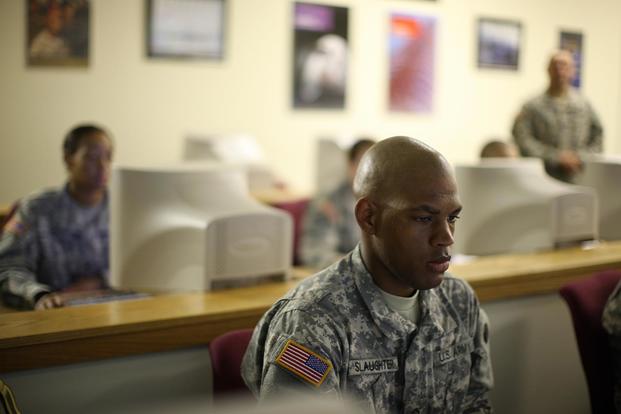A few weeks ago I ran a story about the changes coming with the new Forever GI Bill. In it I said that even though the law was passed back in August, the VA hadn't said too much about when exactly we could expect to see everything contained in the law roll out to the public. Well, lo and behold, a couple of days ago the VA let us know what exactly those changes are, and when we can expect to see them.
Here now are the major changes coming to the GI Bill, broken down by expected implementation date.
Changes effective Now
Lifting The 15-Year Time Limit To Use GI Bill
The law eliminated the current 15-year time limit on use of the Post-9/11 GI Bill for those who were discharged on or after Jan. 1, 2013. This means that you have forever to use your GI Bill benefits!
Related content:
- The New Forever GI Bill -- What It Means for You
- VA Outlines Implementation of Forever GI Bill
- Trump Signs GI Bill Expansion Legislation
This removal of the 15 year time limit also applies to surviving dependents using the Fry Scholarship. Surviving spouses and children who first became eligible after Jan. 1, 2013 will have no time limit to use their Fry Scholarship benefits.
To sum up who is and is not eligible for the new "forever GI Bill":
- If you are a veteran who was discharged before Jan. 1, 2013 you will see no changes, you still have 15 years to use your GI Bill
- If you are a veteran who was discharged AFTER Jan. 1, 2013, you now have forever to use your GI Bill benefits.
- If you are on active duty, have never used your GI Bill and will be discharged on or after Jan. 1, 2018, you have forever to use your GI Bill.
According to the VA, there is no action you need to take; if eligible, the 15 year time limit is simply removed for you.
GI Bill Benefits Restored For Those Who Attended Some Colleges That Closed
If you went to a school that closed or lost accreditation and you didn't get credit for the classes you took, the GI Bill that you used for those classes will be given back to you. This is effective for any school closings after Jan. 1, 2015.
If you were going to a school and the school closed or the course you were enrolled in or needed for a degree had its VA approval withdrawn, the VA can pay you the GI Bill and allow you to complete your degree at a school, even if it had its GI Bill approval withdrawn.
If you transferred to another school and your credits didn't transfer over, the VA can give you back the GI Bill entitlement you used for those classes that don't transfer. You can also keep the housing allowance that you were paid under certain circumstances.
This was effective Nov. 14, 2017 and is retroactive to Aug. 1, 2015.
There are several nuances to this program, and the VA says they will approve requests on a case-by-case basis. They will be releasing more information shortly.
More Guard, Reserve Members Now Eligible
Reservists called to active duty under sections 12304(a) (when a governor requests federal assistance in responding to a major disaster or emergency), or 12304(b) (when the DoD mobilizes reservists in support of a combatant command) are now eligible. Previously, only reservists called to active duty by presidential order as a result of a national emergency were eligible.
This applies to all reservists mobilized after Aug. 1, 2009, but reservists can get only get paid for classes that started after Aug. 1, 2018.
REAP Recipients Now Eligible For Post-9/11 GI Bill
The REAP program is scheduled to end in 2019, but the new law allows some REAP participants to switch over to the Post-9/11 GI Bill. The VA says they are in the process of identifying the approximately 2,800 reservists affected and will send them letters with instructions on how to get the Post-9/11 GI Bill.
Online Technical Training
Online training is now approved at career, vocational, and technical schools. This was effective Aug. 16, 2017.
CHANGES Effective January 1, 2018
New GI Bill Recipients Will Get A Smaller Housing Allowance
There was a little-noticed provision in the 2015 military budget that slows the rate of increase in Basic Allowance for Housing (BAH) so that active-duty BAH no longer pays the full amount of the housing cost.
As a result of that law, active-duty BAH is being reduced 1 percent every year from 2015 to 2019 so that by 2020 BAH will only cover 95 percent of a military member's housing cost. The VA's Monthly Housing Allowance, which is paid to GI Bill recipients, wasn't affected by the earlier legislation.
This new law changes that. Effective Jan. 1, 2018, the GI Bill housing allowance will also decrease. This will mean that anyone eligible for the GI Bill after January 2018 will get an average of $100 a month less housing allowance.
This is only for people who begin getting GI Bill benefits after Jan. 1, 2018. If you are currently getting GI Bill benefits, you will see no changes.
Changes effective august 1, 2018
All Purple Heart Recipients Get Full Benefit
Anybody who is awarded the Purple Heart will get the full GI Bill amount no matter how long they served on active duty.
Fry Scholarship
All Fry Scholarship recipients will become eligible for the Yellow Ribbon Program.
Dependents' Education Assistance (DEA)
Dependents' Education Assistance (DEA) monthly payments will increase by about 50 percent, but the maximum number of months that a dependent can get DEA decreases from 45 to 36. This applies if you begin using the benefit after Aug. 1, 2018. Individuals who first enrolled in school before Aug. 1, 2018, would still qualify for a maximum of 45 months of entitlement.
Monthly Housing Allowance Based On The Campus Where You Attend the Majority of Your Classes
The monthly housing allowance (MHA) will be paid based on the ZIP code of the campus where you physically attend the majority of your classes, rather than the main campus - if the school has multiple campuses.
Changes To Transfer Of Benefits (TEB)
Veterans who transferred entitlement to a dependent will be able to designate a new dependent if the original dependent dies before using the entitlement.
This law applies to deaths on or after August 1, 2009.
Reserve Components Monthly Housing Allowance
Reservists who are mobilized in the middle of a month will have their GI Bill housing allowance prorated. The previous law would stop the GI Bill housing allowance for the entire month if you were called up for at least one day during any month of school attendance, and no matter what day of the month you were mobilized on.
Reserve Duty That Counts Toward Post-9/11 Eligibility
If a Reservist was ordered to active duty after September 1, 2010 to receive authorized medical care, be medically evaluated for disability, or complete a DoD health care study, that time will count as active duty toward GI Bill eligibility. The reservist can use their Post-9/11 GI Bill, if otherwise eligible after August 1, 2018.
FUTURE CHANGES
Pilot Programs For Technology Courses
Effective January 28, 2019, the VA will develop a pilot program to give veterans the opportunity to enroll in special high technology education programs that provide training in high demand skills sought by employers.
More Benefits For Science, Technology, Engineering And Math (STEM) Programs
VA will provide up to nine months of additional Post-9/11 GI Bill benefits to veterans who have (or have almost) used up all their GI Bill benefits, and have at least 60 semester/90 quarter hours credit earned towards a STEM degree. It also will pay those who already have a STEM degree and are working on a teaching certification.
Priority will be given to veterans who are entitled to 100 percent of Post-9/11 GI Bill benefits and to those that require the most credit hours.
VA can pay each eligible individual the benefits for up to nine additional months, but the total may not exceed $30,000. VA will not be authorized to issue any Yellow Ribbon payments.
This is effective on August 1, 2019.
Benefit Tiers
Currently, your GI Bill benefits are based on the amount of active-duty time you have. If you have less than 36 months active duty, you may get less than the full amount of GI Bill benefits.
The new law makes some minor changes to this - specifically people who serve at least 90 days but less than 6 months on active duty will see their benefits increase from 40 percent to 50 percent of the maximum amount payable, people who serve at least 6 months but less than 12 months will see their benefits increase from 50 percent to 60 percent of the maximum amount payable.
This should result in at least $2,000 more annually in tuition for most people in those benefit tiers.
The VA says this will be effective August 1, 2020.
Yellow Ribbon Extension to Active Duty Servicemembers
Active duty servicemembers may use the Yellow Ribbon program effective August 1, 2022.
MORE CHANGES COMING SOON
As you can see, the GI Bill will be undergoing several changes in the near future, we will let you know more as soon as we find out.





